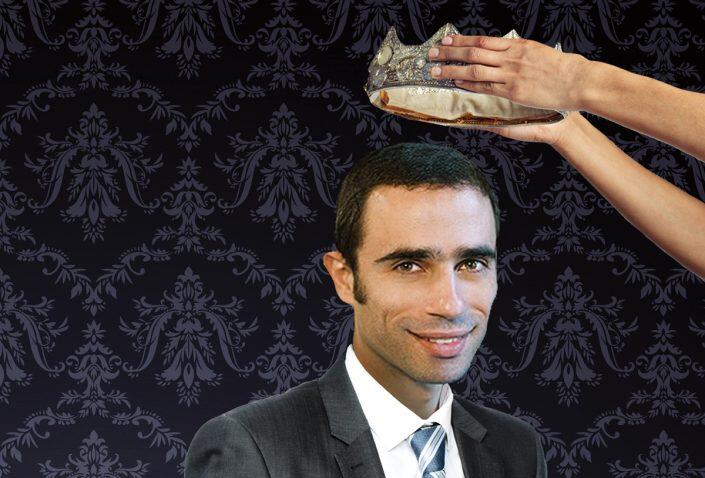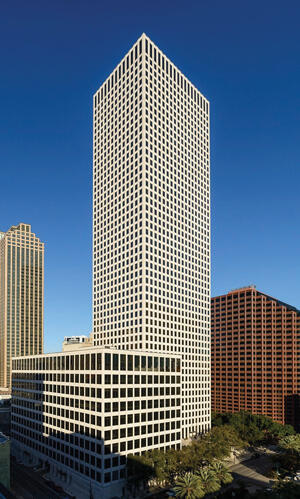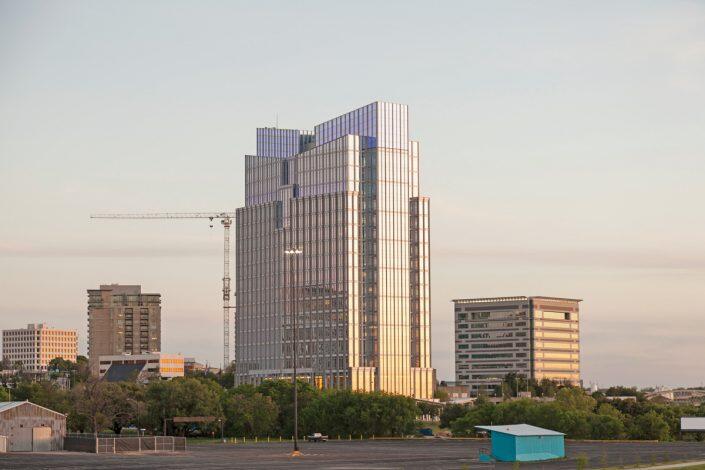 When Zev Hertz took the helm of his father’s real estate business last September, he inherited 21 million square feet of office properties and a company with an origin story that could have been written by Horatio Alger.
When Zev Hertz took the helm of his father’s real estate business last September, he inherited 21 million square feet of office properties and a company with an origin story that could have been written by Horatio Alger.
It goes like this: In 1977, Judah Hertz founded Hertz Investment Group with just $1,000, parlaying some property in Manhattan’s then-dicey Soho neighborhood into a commercial real estate powerhouse. Hertz’s office empire now spans 25 states, with holdings in Indianapolis, Pittsburgh, Cleveland as well as over 4 million square feet of trophy assets in New Orleans.
But those prized properties became major liabilities for the firm after the pandemic sparked a remote-work movement, with offices emptied out nationwide and tenants exiting leases and withholding rent payments.
Santa Monica, California-based Hertz Group was also trying to regain its footing after a planned public offering fizzled out the year before.
In addition, Judah’s announcement that he was stepping down as chair and CEO came five days before Zev took over, and was met with grumbling from some top executives. Meanwhile, Hertz Group didn’t disclose the real reason Judah was ceding control. The founder was dying of amyotrophic lateral sclerosis, the degenerative illness commonly known as Lou Gehrig’s disease.
When Judah’s retirement was announced on Aug. 27, 2020, the company included a statement from him. “I believe we have a strong, diverse portfolio and an outstanding management team, and just felt this was the appropriate time to turn over the day-to-day operations to the next generation of leadership,” it read.
But father and son were also a study in contrasts.
Zev and Judah
Judah’s success hinged on risk. He bought low and had an eye for the future, investing in “undervalued” and “forgotten” properties, as he called them. After targeting New York before Soho’s transformation, he moved on to Miami Beach condos, jumped to Downtown Los Angeles in the leadup to its redevelopment and switched to office investments in second-tier markets.
Where Brooklyn-born Judah was described as charming and warm, Miami-raised Zev is more restrained and private, a man of deep religious faith. “While I am much more reserved than my father, I’d like to think I’m likable as well!” Zev wrote with a hint of humor in response to the comparison.
Exhibiting caution in a volatile market, Zev, 43, has kept a low profile and hasn’t pulled the trigger on the kinds of big acquisitions that marked his father’s career. His biggest moves so far have been to sell off properties — several of them for less than the firm paid. But he has begun a pivot to multifamily, with a 422-unit apartment portfolio purchase in Austin, which closed in June.

The 1.2 million-square-foot Hancock Whitney Center in New Orleans,
which is among Hertz’s office properties.
Compare that to Judah, who took a gamble on L.A. and, when the time was right, sold.
“We had a lot of buildings in Los Angeles, but the market went crazy so we ended up selling there,” he told the Memphis Business Journal in 2012. “But other places, we’re holders for the long term.” Among the areas where Hertz Group remained was New Orleans. Judah maintained a long relationship with the city, starting in the early 2000s, which extended into philanthropy. In 2016 then-Mayor Mitch Landrieu recognized Judah’s financial contributions through his family foundation to support free swimming classes for children.
Where Judah struck out on his own, Zev, who is married and has children, has steadily worked his way up through his father’s firm. A graduate of New York University’s business school, he began his career at Hertz as the onsite property manager of a St. Louis building. Along the way, he became CEO of Platinum Cleaning, an office cleaning company that is affiliated with Hertz Group. Platinum has over 1,000 employees and services over 35 million square feet of commercial space, according to its website. Some of those properties are Hertz towers.
“Family businesses are often ingrained in the DNA of a family,” Zev said. “In my case, it was a natural evolution of how our family evolved.” He added, “I was the one that remained the most connected to the company, and the logical successor to follow in his footsteps.”
Taking command
While Zev hasn’t been a dealmaker, it didn’t take him long to clean house.
He fired several high-level executives, including the president, Gary Horwitz, an 18-year veteran; general counsel John Forbess, 20 years; and CFO James Kasim, who spearheaded a bond offering on the Tel Aviv Stock Exchange the year before. Several others at the firm were also let go. The cuts were attributed to the pandemic and would help “right-size” the company, according to an email Zev sent, which TRD obtained. Horwitz, Forbess and Kasim declined to comment.
And when 72-year-old Judah died in February, most investors hadn’t even been told he had been ill. Before learning about his death, several interviewed for this story thought Judah was still keeping a watchful eye on the company in retirement. Now they feel left in the dark, they said.
“Every penny this company got was because of Judah Hertz,” said one investor, who like most interviewed for this story insisted on anonymity to avoid upsetting the firm. “He would do the lunches, he would wine and dine you… I invested in Judah.”
Succession is often contentious for family-run real estate firms, full of squabbling over leadership roles and financial distribution. Those disputes can lead to lawsuits and instability, and some founders, such as the brothers Elghanayan, have opted to break up their firms to avoid trouble for the next generation.
In this case, there was no fight over succession — Zev’s brother, Yitzi, and sister, Sandy Gordon, do not work for the firm. It was what happened after.

Zev maintains his initial steps followed a “comprehensive review to evaluate how best to move forward,” he told The Real Deal as part of written responses to questions.
But former employees and some investors were rattled by the sudden departures of Judah’s longtime confidants.
“I do know [Zev’s] mindset was one that came from the operations of a janitorial company,” said another former employee. “He thinks anyone can mop or clean a window, but I don’t think he has the understanding that individuals can have institutional knowledge.”
Fire sale
After the executives were let go, Zev sold at least four major properties, three of them for less than the company had paid. More recently, Hertz is facing a foreclosure lawsuit at its 435,000-square-foot tower in Downtown Milwaukee after losing its largest tenant, according to the Milwaukee Journal Sentinel. Nationwide, office property values are down 8 percent from pre-Covid, according to a recent Green Street report.
In November 2020, Zev sold Capitol Square, a 500,000-square-foot office tower in Columbus, Ohio, that Hertz had bought for $42.5 million in 2007, for a little under $37 million. A month later, the company sold its 700,000-square-foot Bank of America Tower in Jacksonville, Florida, for $75.5 million. Hertz had paid $88 million for the office complex in 2014. A short time later, the company sold its 400,000-square-foot Pier 1 Imports Building in Fort Worth, Texas, to the city for $70 million, a heavy discount on the $86 million Hertz Group paid for the building two years earlier.
The total is $33.5 million less than what Hertz paid for those three properties.
At a third-quarter conference call in November, Zev said the company sold some buildings because of the pandemic and the hobbled leasing and subleasing markets. Hertz reported absorption — the difference between space given up and new leases signed — of negative 400,000 square feet. Revenue also fell nearly 10 percent.

Pier 1 Imports Building in Fort Worth, Texas, which Hertz sold at a heavy discount in February.
“We are optimistic that our markets will bounce back; the question is time,” Zev said at the call.
In early January, Zev scored a win when Hertz Group sold Indiana’s tallest building, the 1 million-square-foot Salesforce Tower in Indianapolis, to Square Deal Investment Management for $192.5 million. That marked a healthy premium over the $162 million Hertz had paid for the 48-story tower in 2016.
But there were lingering matters of potential concern for investors. Those included fees Hertz Group-affiliated entities collected — including the janitorial service company Zev also leads — and a tax protection agreement between the family and top-level executives that could complicate the sale of properties.
Investors also say their distributions temporarily stopped under Zev’s leadership and their income from the portfolio is lower than it was in previous years. In this, at least, Hertz’s troubles are shared by other office landlords across the country, with Covid slashing revenues and the delta variant now creating even more uncertainty about the return to the workplace.
Levered up
Hertz Group’s high debt burden had been an issue before the pandemic, and it has put more stress on the firm.
As of the first quarter of 2019, the company’s debt exceeded the value of its real estate assets, according to Hertz’s filing with the Securities and Exchange Commission. The company had over $1.7 billion in outstanding debt from mortgages tied to its 71 properties compared to the net value of those assets, which was $1.5 billion, according to the filing.
Its business model of acquiring properties at 70-80 percent occupancy, then pouring money in to attract new tenants, was severely tested in the last year and a half as leasing ground to a halt.
But Zev said the company’s strategy has not changed.
“We remain focused on maximizing the value of the investments and, when appropriate, harvesting that value,” he wrote in the email. “This centers largely on increasing occupancy, monitoring the asset’s position in its market and overall market conditions.”
He pointed to the firm’s sale of a five-building business park portfolio in Richmond, Virginia, in June. Hertz sold the collection for $39.5 million, having acquired it for $25 million almost a decade ago.
Zev said he has no plans to sell off more properties.
Complications
Hertz’s June 2019 SEC filing before the planned public offering revealed it had lost $12.5 million in the first quarter.
It also showed Hertz Group paid nearly $15 million in janitorial and cleaning services to Zev’s Platinum Cleaning service in 2018. Hertz Group’s property management arm also collected nearly $19 million in fees from its office buildings the same year, the filing showed.
Zev said that both Platinum Cleaning and the property management company operate independently of the larger firm. He acknowledged the two companies are connected, classifying it as “common control.” But he called that an advantage, “because we were able to better manage the cleaning costs for [Hertz] properties” during the pandemic.
The filing for the planned IPO also revealed another issue. Certain members of Hertz’s family and company executives would benefit from what’s known as a tax protection agreement at 10 of its 71 properties. In exchange for agreeing not to sell the properties for 12 years, Hertz family and some executives would not have to pay significant capital gains taxes.
“Our ability to sell or dispose of our properties will be substantially restricted by this obligation,” the company reported in its 2019 filing to the SEC.
Zev denied that the agreement would “change the decision or impact [Hertz’s] ability to sell” properties.
Family business
Over the years, Hertz Group investors generally funded individual projects they had vetted and from which they received returns.
But in 2019, as Hertz prepared to go public, it deployed a “roll-up” strategy for its portfolio. That combined all its individual investments — 71 at the time — into one operating entity. A roll-up meant that investors’ payouts were tied to the total performance of the portfolio, not one development.
While the IPO failed, the roll-up remained. As office markets weakened and valuations declined, overall distributions to Hertz investors also dropped.
Jesse Dean-Kluger, a Miami-based attorney with a focus on real estate law, said roll-ups are usually a good thing for investors.
“The roll-up is supposed to create a bigger market,” he said. The concerns Hertz investors raised are common among outside parties in closely held, family-run businesses.
“By investing in a family business, you are investing in a family,” Dean-Kluger said.
One investor was allegedly prevented from selling a stake in the company. “I want out. I just want to get my money out,” the person said. But with a weakened office market, the person wonders if that’s possible.
Zev countered that anyone can sell to a “qualified” party.
“Every investment has risks, and every investor was well informed of what the risks were for this investment,” he said.
